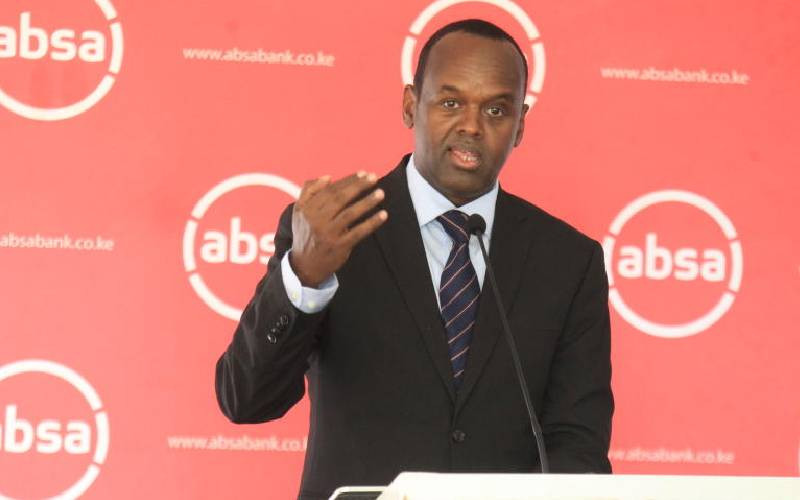
Absa Bank Kenya has posted Sh16.4 billion for the full year for the year ending 2023, an increase of 12 per cent net earnings compared to the previous year.
The lender
attributed increased earnings to increased funding of core sectors fueling Kenya's economic
growth.
Based on the
improved profitability, Absa’s board has
recommended a 15 per cent increase on its dividend to shareholders a final
total dividend payout of Sh7.3 billion, translating to Sh1.35 per ordinary
share.
This will be
in addition to the interim dividend of Sh0.20 per share paid in October 2023,
bringing the total dividend for the year to Sh8.42 billion - representing a
14.8 per cent increase compared to the preceding year.
During the
period, customer loans and advances increased by 18 per cent to Sh336 billion
as the lender focused on supporting key economic sectors such as energy,
telecommunications, manufacturing, trade, commercial property and affordable
housing.
The
Bank also prioritised the needs of the SME sector,
facilitating increased access to financing, access to markets, mentorship, and
networking opportunities, as well as driving digital enhancements to improve
the customer experience.
In the period under review, revenues
increased by 19 per cent to Sh54.6 billion on the back of growing customer
assets as well as faster growth of new business lines such as bancassurance,
asset management, and digital finance.
Interest
income increased by 24 per cent to Sh40 billion, while non-funded income grew
by six per cent to Sh14.5 billion, despite a challenging macros environment.
Speaking while
announcing the results in Nairobi, Absa Bank Kenya Managing Director Abdi
Mohamed attributed the performance to the growth and resilience of its
customers.
“It is also a demonstration
that our strategy is effective in creating value for all our stakeholders while
delivering long-term growth in a dynamic operating environment. With 2023 being
the first year of implementation of our five-year strategy, this performance
gives us a strong launch pad from which we will execute our set priorities.”
The Bank’s
capital and liquidity ratios
remain strong with sufficient headroom above the regulatory
requirement. The Bank’s total capital adequacy ratio closed at 18.1 per cent
and liquidity reserve position at 31.1 per cent against the regulatory limits
of 14.5 per cent and 20 per cent, respectively.
Through the
review year, its customer deposits increased by 19 per cent to Sh363 billion,
with total assets ending the year at Sh520 billion, up from Sh477 billion the
year before, representing a nine per cent increase.
The Bank has
channelled over Sh22 billion into sustainability-linked loans, financing
projects in renewable energy, green construction, and climate-smart
agriculture.
As part of the
strategic milestones that drove this impressive performance, Absa continued to
evolve towards becoming a modern, digitally powered business. In this regard,
the Bank launched the diaspora banking proposition and optimized its digital
banking offerings, including the launch of its digital savings proposition,
introduction of Buy Now Pay Later solution and term loans on Timiza -its
virtual banking proposition.
The Bank’s
statutory operating expenses increased by 16% as the bank executed
transformational and people investments. The Bank has leveraged these
investments to accelerate revenue growth which has led to a significant improvement
in cost to income ratio to 39.7%.
“Absa is well
positioned for growth. With our robust balance sheet and a strong capital
position, we will continue to invest in relevant initiatives that empower our
customers and stakeholders to pursue and achieve their aspirations, while
adeptly navigating external challenges. We are confident in our ability to
accelerate growth momentum and sustainably create value for all our
stakeholders.” Mr. Mohamed said.

No comments:
Post a Comment